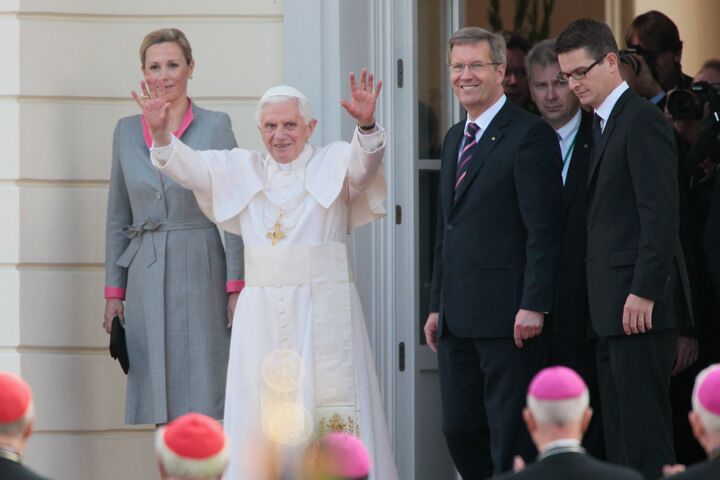
Germany—Behind Benedict’s Words
Our longtime readers will be aware that for well over 50 years under Herbert Armstrong, and for the past two decades and more under Gerald Flurry, we have consistently maintained that it is religion alone that will bind Europe together for the final resurrection of the Holy Roman Empire.
One has to have followed Pope Benedict closely, with an eye to Bible prophecy for these times, to see and to truly understand the Vatican’s motives for the new evangelization of Europe. Germany is the key to the unification of Europe under the 10 kings via the cultural imperialism of the religion of Rome as prophesied in Revelation 17.
Pope Benedict made some statements that are linked to the Holy Roman imperial agenda of European elites in his speech upon arrival at Bellevue Castle on Thursday, official residence of the German president.
In that first official speech of this state visit, Benedict declared before President Christian Wulff and Chancellor Angela Merkel, “I have not come here primarily to pursue particular political or economic goals, as other statesmen rightly do, but rather to meet people and to speak about God.” Thus, from the beginning of his tour of Germany, the pope declared that his main mission was a religious one.
Building on this theme, Benedict then went on to state, “We are witnessing a growing indifference to religion in society …. [A] binding basis for our coexistence is needed; otherwise people live in a purely individualistic way. Religion is one of these foundations for a successful social life.” Then he quoted the words of the 18th-century German bishop and social reformer Wilhelm von Ketteler, “Just as religion has need of freedom, so also freedom has need of religion.”
A glance at the history of the Holy Roman Empire will reveal that the fathers of Rome were convinced their version of freedom was only possible via the religion of Rome, the binding basis filling the need for the collective coexistence of the many differing ethnic groups in Europe.
Benedict knows that if Rome and Berlin in tandem have any hope of realizing their goal of reviving Europe as an empire, then as he and his predecessor, John Paul ii, have declared, Europe must return to its Catholic roots!
To this end Benedict chose his words carefully in his speech before Germany’s president and chancellor: “In human coexistence, freedom is impossible without solidarity. … This holds true not only in private matters but also for society as a whole. In accordance with the principle of subsidiarity, society must give sufficient space for smaller structures to develop and, at the same time, must support them so that one day they will stand on their own.“
Anyone familiar with Catholic social doctrine will recognize that the words solidarity and subsidiarity are trigger words for the imposition of that doctrine in the most imperial sense of Germanic, Catholic corporatism. Those two words are threaded throughout the key treaties that have established today’s European Union based on the Romish-Teutonic model.
But there was another veiled message in the pope’s speech, meant for the ears of both Germany’s president and its chancellor in their nation’s and Europe’s present time of deep crisis.
“Society must give sufficient space for smaller structures to develop and, at the same time, must support them so that one day they will stand on their own.” The keenest observers of the European scene will recognize that this is a recognition by the pope that the EU cannot survive in its present 27-nation unwieldy formation. It must downsize to a collective of “smaller structures” which can “stand alone.”
To the mind truly attuned to this pope’s intentions, this was clearly a public endorsement for a move to a two-tier EU, consisting of a collective of smaller structures, with “society” (meaning the Catholic society of elites) supporting them. This is code for solidarity and subsidiarity in action—on Rome’s terms!
The solidarity comes from the binding cultural force of Rome’s religion. The subsidiarity refers to the governance of individual regions of nations reporting politically to Rome’s traditional protector, Germany.
As we have said, there is much more to the timing and the nature of this visit to Germany by Pope Benedict xvi. It bears powerfully on the imminent fulfillment of the prophecy for a 10-nation combine governing Europe under the umbrella of Rome and Berlin.
View the latest twoKey of David programs on our website and read our editor in chief’s personal in the latest edition of the Trumpet magazine for a true prophetic perspective on that which is fast developing out of today’s great crisis in Europe.
